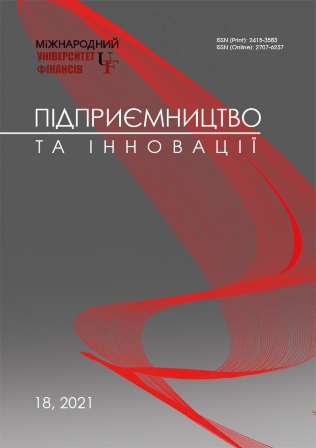THE ROLE AND PLACE OF THE INTELLECTUAL COMPONENT IN THE FORMATION OF TNC BUSINESS MODELS
Abstract
As the productive forces develop, competencies determined by intangible factors begin to prevail in competition. Back in the early 2000s, the leading positions in the market were occupied by multinational corporations, which focused on competitive advantages that contributed to the development of modern technical equipment, qualified personnel and guaranteed access to the necessary material resources. However, with the development of new technological systems as a result of global political and economic processes, the main condition for the success of the competitiveness of TNCs is the presence of other assets in the company, namely, intangible assets focused on the prevalence of intellectual capital. After all, the complexity of doing business in today's world is due to many factors, including ever-increasing competition (which has become global), the use of new technologies, shortening product life cycle, information power, customer power, flexibility of organization and business as a key factor, demographic trends. The ability to convert intellectual resources into goods and services that have public utility and added value is becoming a critical competence in modern business. That is, there is the formation of post-industrial (information-innovation) society, when the era of the new economy is manifested in a new content, where the knowledge resource reaches a qualitatively new level. During the formation of the knowledge economy, the set of TNCs becomes an independent subsystem of the world economy, which has a decisive influence on the functioning and development of individual national economies, international institutions, integration groups and more. This is primarily due to the advantages of the integrated structure of TNCs, the positive effects of centralization and concentration of both financial and credit and knowledge resources that allow them to dominate the world market, as well as gain exclusive access to unique competitive advantages in the context of global change. economy in the XXI century. Moreover, the corporation itself is constantly in a state of dynamic transformation and is actively adapting to new environmental conditions.
References
Ансофф И. Стратегическое управление / под ред. Л.И. Евенко ; пер. с англ. Москва, 2018. С. 54–67.
Ильяшенко С.Н. Применение методов и инструментов маркетинга в управлении знаниями. Маркетинг и менеджмент инноваций. 2019. № 2. С. 45–49.
Мельник Л.Г., Ильяшенко С.Н., Касьяненко В.А. Экономика информации и информационные системы предприятия : учебное пособие. Сумы : Университетская книга, 2018. С. 48–56.
Shevchuk O.A. Knowledge – as the main strategic resource of the enterprise. Technological audit and production reserves. 2017. № 2. Р. 46–49.
Rudenko M.V., Kryvoruchko V.O. Management of knowledge as a competitive advantage of the enterprise. Economy and State. 2018. № 4. Р. 74.
Ansoff I. (2018) Strategicheskyi management [Strategic management]. Moscow: Ekonomika. (in Russian)
Iliashenko S.N. (2019) Primenenie metodov i instrumentov marketinha v upravlenii znaniiami [Application of methods and instruments of marketing in management of knowledge]. Marketinh i menedzhment innovatsii, no. 2, pp. 45-49.
Melnik L.H., Iliashenko S.N., Kasianenko V.A. (2018) Ekonomika informatsii i informatsionnye sistemy predpriiatiia [Economics of information and information systems of enterprise]. Sumy: Universitetskaia kniha. (in Russian)
Shevchuk O.A. (2017) Knowledge – as the main strategic resource of the enterprise. Technological audit and production reserves, no. 2, pp. 46–49.
Rudenko M.V., Kryvoruchko V.O. (2018) Management of knowledge as a competitive advantage of the enterprise. Economy and State, no. 4, pp. 74.



